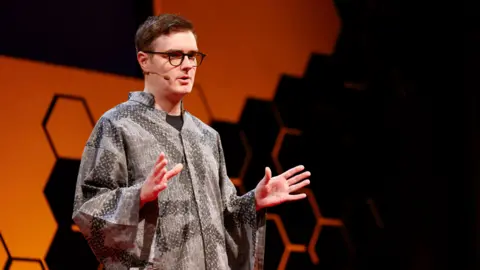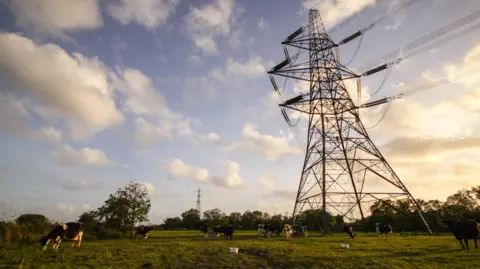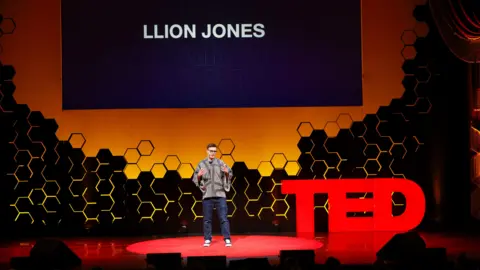AI pioneer calls for UK to 'be brave' in tech race
 Ted AI
Ted AIA computer scientist who revolutionised the use of artificial intelligence (AI) has called for the UK to be "brave" in its pursuit of the technology.
Llion Jones from north Wales, who was part of the pioneering Google team that unlocked AI's ability to respond in a human-like form, warned against trying to compete with "hyper-scalers" in the USA and China.
He said the "sycophantic" responses of the current wave of AI chatbots needed to be fixed.
"We need to make AIs that can actually disagree with you, and actually correct you," he said.
Mr Jones is one of the co-authors of the 2017 paper Attention Is All You Need, which introduced the Transformer architecture that put the "T" in ChatGPT. It was a breakthrough that now underpins the generative AI systems that are transforming business and everyday life.
Still based in Tokyo, is now the chief technology officer of Sakana AI, the firm he founded with another former Google researcher.
His company focuses on speculative research into future uses of AI, something he claimed was "unique", as other big tech firms were focussed on monetising the current wave of large language models.
"I do genuinely think that we are unique in that respect right now," he said, in an exclusive interview with BBC Wales.
"I'm trying to make the environment to give people the freedom to do the research they want, and I'm going to try and protect it as long as I can."
Mr Jones said governments in Cardiff and Westminster needed to accept the reality of a global race which was being won by America and China, and focus instead on different types of AI developments.
"I think a country like Wales, or even Britain in general, is not going to beat the hyper-scalers, right? They're not going to beat America and China in scaling up these AIs.
"It doesn't make any sense to be a part of that race, because you're not going to win.
"So, what can you do? You can embrace the idea that you can do something different. And that involves being a little bit more brave."
He argued that "something that Wales could do is to do what I'm trying to do - create an environment in Wales where companies and the academic institutions feel like they have the resources, and the freedom, to start doing much more differentiated research".
"It's a bit of a longer bet, but if it pays off then you're back in the race, right?"
 Google
GoogleWhile consumers have access to AI services on their smartphones, businesses in Wales are already racing to integrate time-saving and productivitiy-enhancing technology into their operations.
Google hosted an AI event with the UK government in Cardiff to encourage companies to see the benefits of adopting the new technology.
"AI is not one thing, it can be used in so many different situations," said Business Secretary Peter Kyle MP.
Some of the businesses at the event "are doing work on film sets, they're doing work in the lived environment... and on digital transformation," he added.
"If this is incorporated throughout the economy, it has a transformative impact on the economy. It means that more of the mundane tasks are taken away, a lot of the running of the business is actually expedited," Kyle said.
He added that a 1% increase in small business productivity would generate £240bn worth of economic activity.
AI growth zones have been announced in north and south Wales, while the Welsh government's AI Plan for Wales promised to ensure artificial intelligence could be used to "drive economic growth, enhance public services... and equip people across Wales with the skills to thrive".
It includes a commitment to invest in AI innovation and skills in the public sector, and to develop ethical guidance for using the technology.
Who is Llion Jones?
Raised in Bangor and Abergynolwyn in Gwynedd, Llion Jones studied at Birmingham University and worked in the UK tech industry before being recruited by Google.
In California, he was one of the pioneering team of researchers that put the 'T' in ChatGPT.
The T is the Transformer architecture that allowed AI to learn patterns from vast amounts of data, unlocking generative AI's ability to write, reason and create at human-like levels.
He moved to Japan with Google, eventually leaving the company to launch his own deep-learning AI business.
Watching the world grapple with the technology he has helped to unlock, Mr Jones said the current iteration of AI assistants needed to be less sycophantic towards their users.
 Getty Images
Getty ImagesAny expansion of AI research and development in Wales would require investment by universities and government.
But the computing power required to process and host AI services would also need a power grid which isn't currently available in all parts of Wales.
There have been considerable protests against plans to increase electricity grid capacity in mid Wales, due to the operator's intention to erect pylons across rural areas.
"Mid Wales is chronically under-served by modern grid infrastructure," said Stuart George, chief executive of Green GEN Cymru which is attempting to build the pylons.
Despite fierce opposition in some areas, Mr George argued the roll-out of a more reliable electricity grid was essential in order to supply existing and future demands.
"What we need to be better at is telling the story of the benefit that can come from this," he said.
"There's so much more benefit that comes from the modernisation of grid infrastructure.
"When you look at what the future will look like - electric vehicles, electric home heating systems. The ability for businesses to decarbonise and also grow and develop within mid Wales is currently impossible."
Mr George warned Wales could "lose out" on the AI race if it did not have the infrastructure to attract data centres and research facilities, and said politicians needed to make difficult decisions.
Commitments to decarbonise the electricity supply meant "the grid infrastructure that is required to unlock that renewable energy is an inevitability, and that means that they have to make the big decisions and they have to make them quickly".
 TED AI
TED AIWhile Llion Jones's research is focussed on the future of AI, he had a recommendation for dealing with the present wave of AI chatbots.
"They've become very sycophantic," he said.
The training of AI models was leading them to give answers that please the humans who are interacting with them.
"Unfortunately, humans love being told that they're right.
"This means that a lot of people can become misled by the fact that you can tell [the AI chatbot] almost anything, and they'll just say, 'Yes, you're right, that's brilliant, that's such an amazing idea.'
"So we need to fix that problem, we need to make AIs that can actually disagree with you, and actually correct you."
